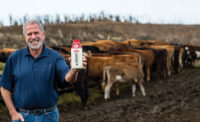Organic dairy processors have a mission
Producers of organic dairy should highlight their products’ transparency, healthfulness and sustainability to attract today’s informed consumers.










There are many unknowns in these early days of the COVD-19 pandemic, but one thing is clear: People will be eating many more meals at home for the near future. While this poses a challenge for dairy overall — with its ties to the foodservice industry — the organic side tends to be stronger in retail, says Joe Baird, CEO of Willows, Calif.-based Rumiano Cheese Co.
“There are relatively small amounts of organic that are used in foodservice,” he adds. “Accordingly, the reduced restaurant sales have not hit organic as severely as they have hit conventional.”
Initial data show that interest in organic food is growing as more people stay at home. According to the “Unpacking Interest in Organic Foods Q2 2020” report from Los Angeles-based DISQO, 58% of people surveyed in early April said that they care about whether their food is organic, which is up from 55% in February.
“There has been a significant increase in consumers reporting that they seek organic options when shopping for dairy products,” said Carl Van Ostrand, vice president of consumer insights at DISQO. “As of early April, 25% of people reported that they actively shop for organic dairy, a figure that was 22% just a couple months ago. This marks a 16% growth rate for interest in organic dairy in just two months.”
Van Ostrand does note that sales increases might be due to availability: Consumers are forgoing their “go-to” options as grocery stores often are out of staples.
Despite data from the past couple months, the organic category has tended toward slower, but steady, growth in recent years, notes the Hartman Group Inc., Bellevue, Wash., in its “Organic and Beyond 2020” report.
“While growth has slowed, consumers remain interested in and committed to seeking out products with attributes that convey quality and purity,” the report says.
While it remains to be seen if new growth rates will continue after quarantine restrictions are lifted, Sheryl Kesey Thompson, co-owner and vice president of marketing for Eugene, Ore.-based Springfield Creamery, says she expects the underlying factors that contribute to consumer interest in organic dairy to stick around.
“At this time, we see a strong natural and organic product category, as consumers are turning to healthy, organic products to help support their immunity and overall good health,” she notes.
Health claims
One of the primary reasons consumers choose to buy organic dairy are its health claims, notes La Farge, Wis.-based Organic Valley. The company recently did an attitude and usage study to learn what attracts people to its products.
“Consumers, especially moms, told us that they buy organic because they believe it is a better choice for their family's health than conventional,” Organic Valley says. “They believe organic products deliver high quality and safety for their families.”
Christopher Malnar, vice president of marketing for Stonyfield Organic, Londonderry, N.H., agrees that parents are particularly cognizant of the health claims of organic dairy.
“We know that for 67% of parents at home, the No. 1 reason they choose organic foods is to avoid pesticides,” he says. “They prefer to feed their families products that are made without the use of toxic persistent pesticides and food made with high-quality ingredients that they can trust.”
For its part, Horizon Organic, a brand of Danone North America, based in White Plains, N.Y., and Broomfield, Colo., released a new organic fluid milk product designed especially for children’s nutrition: Horizon Organic Growing Years.
“Developed with pediatricians, every 8-ounce serving of Horizon Organic Growing Years contains 50 milligrams of DHA [docosahexaenoic acid] omega-3 to help support brain health, along with prebiotics and a good source of choline to help transport DHA in the body,” says Domenic Borrelli, president of premium dairy and plant-based food and beverages at Danone North America.
Many consumers also look for other health claims such as lower sugar and a simpler ingredient list. Last year, Organic Valley unveiled Organic Valley Ultra, the first organic ultrafiltered milk. It has 50% more protein and 50% less sugar than regular milk.
“Organic Valley Ultra was developed in response to consumer demand for high-protein, low-sugar organic options produced without toxic pesticides or artificial growth hormones,” Organic Valley says.
Philippe Chevrollier, general manager of Sonoma, Calif.-based St. Benoit Creamery, says a recently published report from Chicago-based data technology company SPINS shows that food and beverages that fight inflammation, support immunity and reduce stress are popular.
“In the organic category, there is a consistent inclination towards health and wellness,” Chevrollier notes. “Products that align with the idea of being better-for-you are trending.”
Wellness includes preventative daily health care, Malnar explains; for example, consuming more probiotics for immunity and digestive health. In response, Stonyfield launched Stonyfield Organic Daily Probiotics, which are shots of probiotic yogurt.
Daily Probiotics are available in Blueberry Pomegranate and Strawberry Acai flavors. The shots are made with real fruit and organic low-fat milk and contain only 60 calories. They come in six-packs of 3.1-ounce shots and have a suggested retail price of $4.49.
“Whether it be for daily continued health, or digestive and immunity support, consumers know that probiotics are beneficial to their health,” Malnar says.
Focus on sustainability
Many consumers choose organic dairy because of their concerns about climate change and the environment. Accordingly, organic dairy processors could benefit from clearly communicating their sustainability initiatives.
“Sustainability has … joined quality and health and wellness as key drivers for organic purchasing, harkening back to the roots of the organic movement, when protecting the environment was a central principle,” the Hartman Group reports.
Organic Valley says its aforementioned study revealed that people “want to be associated with brands that have a positive impact.” Many are trying to be responsible consumers by purchasing products that are good for their communities and for the planet.
According to Chevrollier, organic is more than just a word. The organic dairy industry benefits from a “halo effect,” as consumers tend to associate it with sustainability and animal welfare.
“When you go organic, it’s a specific mindset and conviction about your relationship to the environment and a desire for transparency about what’s in your food and how it’s grown,” he says.
For its part, Horizon Organic has big sustainability goals. According to Borrelli, the brand plans to be carbon-positive by 2025.
“Our goal is to be the first national dairy brand to become carbon-positive across our full supply chain,” he explains. “As a brand that has always pioneered advancements in the organic industry, Horizon Organic will achieve carbon neutrality, and then go even further, to remove, reduce and offset additional emissions from entering the atmosphere, becoming carbon-positive.”
Albert Straus, founder and CEO of Straus Family Creamery, Petaluma, Calif., says the organic dairy category could grow more as consumers learn that livestock agriculture actually can be a solution for climate change.
“Grazing promotes soil health by restoring its carbon content, captures carbon dioxide from the air through photosynthesis and has been described as the most effective mechanism known to humankind in addressing global warming,” he explains. “As the public becomes more aware of this solution and the need for a local sustainable food system, we’ll see continue growth in this area.”
For its part, Rumiano Cheese plans to emphasize its environmental commitment through the launch of a new brand.
“Soon we will be launching an all-new brand of consciously produced grass-fed dairy and plant-based foods,” says Baird Rumiano, president of Rumiano Cheese. “The mission of the brand is to support and improve the health and welfare of people, animals and the planet.”
Label confusion
While the majority of consumers still trust the USDA organic label, recent data suggest some are concerned that its legitimacy is declining.
“With the organic seal becoming more pervasive across categories, as well as recent news about fraud cases and government relaxation of standards in many areas, some are questioning whether the certification is being weakened,” the Hartman Group says.
Borrelli concurs.
“Some people worry that organic standards are not being met with the same rigor as in the past,” he says. “In addition, some consumers are confused about what is and is not considered organic.”
Accordingly, consumers are not just looking for the organic label; they also are paying attention to the perceived trustworthiness of brands themselves. And according to the Hartman Group, trust in organic brands “from both mainstream retailers’ private label and conventional manufacturers has increased since 2018.”
For its part, Danone North America is “pushing and evolving” its corporate standards to meet new consumer demands, Borrelli notes. This includes adding extra certifications such as Non-GMO Project Verification and Animal Welfare Certified.
“The organic category needs to reassert its unique advantage to consumers with all that it encompasses,” he adds.
Preparing for a new reality
While organic dairy’s strong retail presence has sustained sales during the COVID-19 pandemic, the industry is facing other challenges. One of the main ones is an unpredictable demand pattern that has made production planning difficult, Joe Baird says. An initial spike in sales due to panic buying has waned, and many companies are now in unchartered territory.
“We do know that the initial spike in demand for fluid, especially [ultra-high-temperature], has subsided, which could again make oversupply of milk possible,” he explains. “One of our other problems is the impacted supply chain and how to get product on grocery shelves. We have customers who are out of stock due to distributor constraints.”
Organic Valley says it has been able to weather supply-chain difficulties because of its geographically diversified approach. It works with over 1,800 farmer-members throughout the country and 90 co-processors.
“Since we work with so many processors located within each region, our supply chain is localized, diversified and resilient,” Organic Valley says.
Malnar says that there has been an increased demand for Stonyfield Organic’s products. The company’s yogurt sales were up 15.7% in March 2020 in comparison to the same timeframe in 2019.
“Quarts and multipack items specifically continue to do really well. Our classic quart-sized container items were up 27% in March as consumers look[ed] to purchase bulk items with multiple servings,” he says.
However, the company hasn’t needed to hire new employees to meet the demand.
“Our current teams are doing everything they can to maximize runs,” Malnar adds. “To help compensate our manufacturing employees, we’ve increased wages by $2 an hour for everyone working in the plant and warehouse.”
Some organic dairy processors report that they are trying to find ways to implement additional safety measures to protect against the coronavirus. For its part, St. Benoit is “making additional sanitizer available for office staff, implementing social distancing practices for essential employees, and suspending creamery visits and unnecessary business travel,” Chevrollier says.
And Danone North America is monitoring changes in how consumers purchase food due to the pandemic, Borrelli says.
“Over the last few weeks, given our global pandemic, we’ve seen shifts in how people are making decisions about the food they purchase,” he notes. “People are trying to limit their trips to the grocery store and are increasingly turning to delivery and online retailers.”
Joe Baird says he thinks there will be more at-home eating for the next couple of years. Accordingly, Rumiano Cheese is investing more in e-commerce, which will be a “permanent adjustment.”
According to Baird Rumiano, the company is looking into designing retail packages that include snack foods and at-home meals.
“While we cannot predict the market through the chaos of the crisis, we remain optimistic about the success of organic products and believe that consumers will increasingly choose organic dairy if they know the animals and land are cared for,” Joe Baird says.
Looking for a reprint of this article?
From high-res PDFs to custom plaques, order your copy today!











